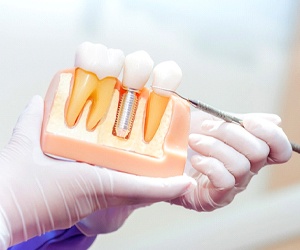

Many people who have lost one or more teeth are interested in dental implants. However, they might have been told they do not qualify for the procedure due to some bone loss in their jaw. A bone graft can address that issue, but for some patients, a different solution is available: mini dental implants. Mini implants in Fort Myers are smaller than their traditional counterparts and therefore require less bone mass. Continue reading below to learn more about this remarkable treatment.

Mini and traditional dental implants have a similar shape and serve the same purpose. They are both able to serve as prosthetic tooth roots. They are also the same length. However, their widths are quite different. A traditional dental implant is between 3.4 and 5.8 millimeters wide, while a mini implant is between 1.8 and 3.3 millimeters wide. The smallest dental implants are just a smidge wider than a standard toothpick.

Mini dental implants offer many of the same benefits as traditional ones. For example, they provide permanent tooth replacement, help to preserve the jawbone, and offer natural feel and function. Their restorations boast a beautiful appearance.
However, mini dental implants have a few advantages over traditional ones:

The best way to find out if many dental implants are right for you is to consult with an expert who offers them. After Dr. Hoop examines your mouth and takes some X-Rays, he will be able to design your custom tooth replacement plan. Mini implants may be right for you if:
Of course, regular dental implants are better in some cases. They may provide a stronger bite force and be slightly better for the jawbone’s long-term health.

Both traditional and mini dental implants present a significant upfront cost. In general, though, the cost of mini dental implants is slightly lower than that of traditional implants. There are a few reasons for this, including the fact that mini implants typically require just one surgery. They are also usually placed under local anesthesia, with no need for sedation.
When you visit us for your consultation, we will provide you with an estimate for the cost of your treatment and help you explore your payment options. Your insurance policy (or a dental discount plan) along with financing may make it easier than you expect to afford your new smile!

Mini dental implants in Fort Myers are an elegant solution for missing teeth. When you are interested in learning more about them, Dr. Hoop and our team are ready to consult with you. In the meantime, you can learn more about this treatment by reading the list of FAQs below. Make a note of anything that you would like further explanation on — we look forward to answering all of your questions!
Many people with missing teeth do not have adequate bone volume to support conventional dental implants. However, their jaws are strong enough and large enough for mini dental implants. These prosthetic tooth roots can be used to support a variety of restorations, including single crowns, multi-unit bridges, and full dentures. During your consultation in our practice, you can find out for sure whether mini implants are a fit for your unique situation.
In the past, patients with inadequate bone volume for conventional implants either had to get a bone graft or opt for non-implant forms of tooth replacement. Now, though, researchers have developed mini implants that are incredibly durable, minimally invasive, and suitable for many patients, including those who have experienced a degree of bone loss in their jaw. Indeed, this treatment is making implant-based tooth replacement available for millions of people who were never previously candidates!
Mini dental implants are inserted into the jawbone during a minimally invasive oral surgery. Your mouth will be numbed, and you may be sedated. Next, a very small incision will be created in your gums in order to access the underlying bone. The implants will be carefully inserted at precise, pre-planned positions. The heads of the implants will remain protruding above the gumline so it will be easy to restore them with a crown, bridge, or denture.
Some soreness after the surgery is normal. However, because the procedure is so minimally invasive, any discomfort should be easy to cope with. You will receive detailed instructions to make your recovery as easy as possible. You should be able to begin eating soft foods soon after your surgery — after any local anesthesia wears off. If you run into any questions or concerns during your healing period, call our office right away.
One of the most common uses of mini dental implants is to increase denture stability. If you have an existing denture, it might even be possible to retrofit it so it works well with your new prosthetic tooth roots and can easily snap onto and off of them.
Of course, denture wearers are not the only people who can benefit from mini dental implants. They can also replace single teeth, as well as multiple teeth in a dental arch that still has some natural dentition in it.